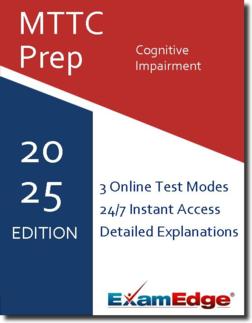MTTC Cognitive Impairment (056) Practice Tests & Test Prep by Exam Edge - Topics
Based on 28 Reviews
- Real Exam Simulation: Timed questions and matching content build comfort for your MTTC Cognitive Impairment test day.
- Instant, 24/7 Access: Web-based MTTC Cognitive Impairment practice exams with no software needed.
- Clear Explanations: Step-by-step answers and explanations for your MTTC exam to strengthen understanding.
- Boosted Confidence: Reduces anxiety and improves test-taking skills to ace your MTTC Cognitive Impairment (115).

Understanding the exact breakdown of the MTTC Cognitive Impairment test will help you know what to expect and how to most effectively prepare. The MTTC Cognitive Impairment has 100 multiple-choice questions The exam will be broken down into the sections below:
| MTTC Cognitive Impairment Exam Blueprint | ||
|---|---|---|
| Domain Name | % | Number of Questions |
| Understanding Students with Cognitive Impairments | 13% | 13 |
| Assessing Students with Cognitive Impairments and Developing Individualized Programs | 20% | 20 |
| Promoting Development and Learning in Students with Cognitive Impairments | 47% | 47 |
| Working in the Professional Environment | 20% | 20 |


